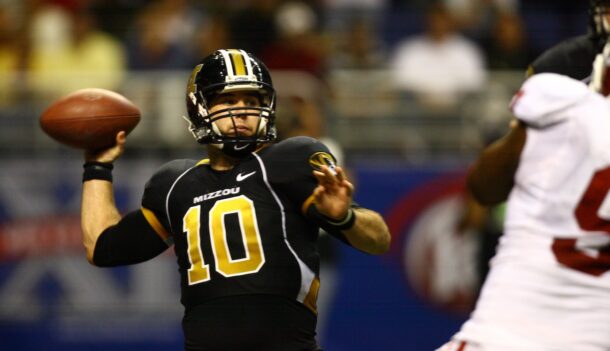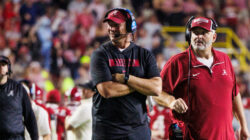
Bobby Bowden’s excellence changed Florida football — and as a result the SEC — forever
The news that former FSU coaching legend and Hall-of-Famer Bobby Bowden had been diagnosed with a terminal illness hit sharply and suddenly on Wednesday.
Bowden, 91, has lived a full, good, purpose-driven life, and while there’s sadness in the news he won’t be with us much longer, the other sharp feeling was sentiment. This is especially true for southern men in their early 40s like me, who came of age at a time when Bowden transformed the sport, fielding dominant teams for the better part of two decades in Tallahassee.
Bowden transformed a sport. Before there was Saban and Alabama’s immaculate run of the past decade and a half, there was Bowden’s FSU, the little program that could, the program that rose from humble roots to become the benchmark by which college football excellence was measured. When Bowden took the FSU job in 1976, the Seminoles were a parochial afterthought in a too often forgotten part of the state of Florida. He built them into a national power brick by brick, winning 12 ACC championships and 2 national championships along the way and finishing in the top 5 of the final AP poll an astounding 14 consecutive seasons from 1987-2000, a feat that Saban hasn’t replicated in Tuscaloosa and given that fact, it is fair to wonder if anyone ever will. But there are plenty of days and discussions to be had about the weight of Bowden’s impact.
The definition of FSU football pic.twitter.com/DLzCLqojCC
— Tyler Huck (@TylerHuck) July 21, 2021
More specifically, Bowden played an immense role in transforming the SEC. How a coach could help transform a league he never coached in — and one his administration actively avoided (of joining the SEC, Bowden famously said, “I’m not going to cut my nose off to spite my face”) — is less complicated than you think.
Bowden, of course, was the coach of Florida’s rival. As the Gators ascended under Steve Spurrier, who dragged the SEC out of the 3 yards and a cloud of dust 1980s and into the modern era, Bowden was the final obstacle, the last fortress for Florida to conquer on its way to national prominence.
Bowden wasn’t just a thorn in Florida’s side, a coach who went 8-5-1 against Spurrier in 14 matchups over 12 seasons. He was an aspirational albeit villainized figure, the guy leading the program that pushed Florida to be better.
There was no one in the SEC that could push the Gators and Spurrier the way Bowden and the Seminoles did. Consider this: By the end of 1995, Spurrier had already won the SEC four times (the 1990 title was stripped due to NCAA violations by the prior coaching staff). The Gators were routed by Nebraska in the 1995 national championship game, to be sure, but the reason Florida had only one shot at a national title in Spurrier’s first 6 years in Gainesville wasn’t because there was an Alabama or a Georgia or a Tennessee in their way. It was because of Bowden, and that rivalry game on Thanksgiving weekend every November.
When I heard the news Bowden was “at peace,” I was glad. He deserves to be and his family deserves our thoughts, prayers and good graces.
But for a young kid and teenager who grew up living for college football Saturdays and trips to Gainesville to cheer on Spurrier’s Gators with my Dad, it was hard not to think of the Florida-FSU rivalry, too. The memories I have of Bowden and his imperious Seminoles teams are as thick as the humid Florida summer air. The way that rivalry shaped Florida’s football future, and ultimately helped transform the SEC into the behemoth it is today, shouldn’t be lost on anyone.
Growing up in a Florida family watching Bowden meant — and means — two things.
First, you had a burning desire to see Bowden fail, even though you just knew his teams wouldn’t; they were too good. Still, you laughed at every Spurrier zinger, like “Free Shoes University,” knocking a FSU shoe and merchandise scandal involving some of Bowden’s FSU stars that today I think we’d just call name-image-likeness foreshadowing.
Second, barbs and burning desire to win aside, you have “where were you” memories of games past so thick you have to brush them away from your face: that screen pass Warrick Dunn caught in The Swamp in ’93 when it seemed like the Gators had all the momentum (with my late Grandfather while my Dad and Mom took in the game); the Choke at Doak in ’94 (with my cousins in Jacksonville eating Thanksgiving leftovers); Wuerffel to Hilliard late to cap an unbeaten regular season in ’95 (with my Dad in the Sunshine Seats, north endzone); the “echo of the whistle” loss in Tallahassee in ’96 (with my Grandfather again, hearing the best man I’ve ever known hurl a rare profanity — at Bowden and Mickey Andrews, of course); the 52-20 Sugar Bowl beatdown that followed five weeks later, as Spurrier won his only national championship (with my Dad, in our living room, and then parading around the neighborhood with my Dad’s 1980’s style Gators flag until late in the evening); “the Greatest Game Ever Played in The Swamp” in 1997, when Spurrier denied one of Bowden’s greatest teams a national title behind 4 Fred Taylor touchdowns (at home waiting on a high school sporting event while my Dad was at the game); “the Rooster” game in ’98, when FSU denied Florida a national championship rematch against Tennessee (in a cold, damp Doak Campbell, with FSU fans tomahawk chopping my head the entire fourth quarter) — and yes, I could go on.
The lesson in all those games, so many of them with Florida on the short stick, was that greatness wouldn’t come easily for the Gators. No matter how simple Spurrier made scoring points look, FSU was always waiting in November. Bowden knew it, and, perhaps more important, Spurrier did, too. Spurrier adapted because Bowden forced him to adapt.
When Bowden chirped “Steve has a flaw in his blocking scheme,” after the Seminoles win in November 1996, a game dominated by the FSU defensive line, Spurrier installed a shotgun for the Sugar Bowl rematch. The move bought Wuerffel an extra half-second of time, and the adjustment changed everything.
When Bowden and Andrews’ exotic blitzing schemes and speed on the defensive line threatened to confuse his young quarterback in 1997, Spurrier rotated his quarterbacks every play to assure he had the chance to coach them up on FSU’s personnel sets and schemes. The decision was “mad genius” stuff, but it delivered one of Florida’s biggest upset wins in school history.
Spurrier pushed Bowden too, of course, and as the two have grown older, Bowden has become more candid about it.
“If it weren’t for me, I reckon Steve has at least two more national championships,” Bowden told me a few years ago, when I was given the chance to write about Spurrier on this website. “Of course, you could say the same thing about his teams and us, too. He cost us at least two.”
Even if they approached it differently — Spurrier with the quarterback’s swagger and bravado and Bowden with the “aw shucks” demeanor of a Sunday school teacher — the insatiable desire Bowden and Spurrier had for competition, particularly with one another, defined college football in the 1990s. It also helped drag the Gators — and with them the SEC — out of their own personal stone ages and into the scenes and stories and wall to wall coverage we know today.
That isn’t Bobby Bowden’s legacy, which goes much further than that, and touches every corner of the state of Florida and towns and families and lives he changed for the better. But it’s part of that legacy — and like everything with Bowden, the mark left behind is indelible.
Neil Blackmon covers Florida football and the SEC for SaturdayDownSouth.com. An attorney, he is also a member of the Football and Basketball Writers Associations of America. He also coaches basketball.







